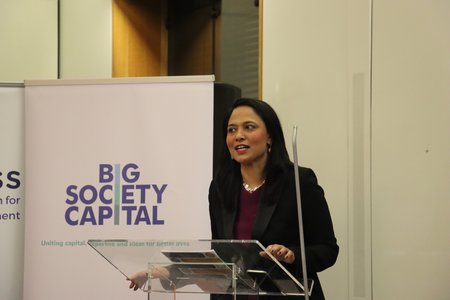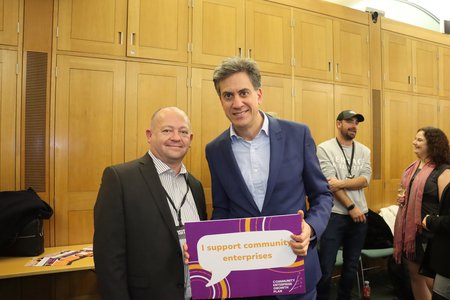Members of Parliament, social enterprises and investors from across the UK gathered in Portcullis House in Westminster yesterday for a ‘meet and greet’, where MPs were invited to engage with their essential work in supporting communities.
The early Social Enterprise Day celebration was organised by Big Society Capital, the UK’s leading social impact investor, Access - the Foundation for Social Investment and other sector partners. They are calling for more support from current and future governments to help create jobs, boost growth and address social inequalities by unlocking new investment
Social Enterprise Day is held as part of Global Entrepreneurship Week to showcase the essential role of the UK’s 100,000 social enterprises which contribute £60 billion to the economy; employ around 2 million people; and, according to new data from Social Enterprise UK, generate over £1 billion of profit which is reinvested into their mission.
The majority of the forty frontline enterprises attending have utilised social impact investment to help build resilience and scale - very often because mainstream lenders will not consider them. Big Society Capital has alongside partners invested £2.1 billion into more than 2,000 enterprises across the country tackling issues spanning homelessness to mental health.
Among the enterprises to meet their MP were Refurnish from Doncaster who met with Ed Miliband and gave insight into their work collecting, restoring and selling furniture to low-income families and offering employment and training to those on the margins of their local community. CEO Andy Simpson said: “Our first investor (the Key Fund) enabled us to set the project up to do a pilot where in the first three months we were able to support 960 individuals and families, with product that would have gone into landfill”.
Ed Miliband MP, Shadow Secretary of State for Energy Security Net Zero, praised Refurnish’s impact, and said that “I think social enterprise is a great model, I think lots of businesses are learning from that model and are reflecting it, whether they're social or not, in what they're doing. Social enterprises have an impact in themselves, and they also have an impact influencing other businesses.”
Big Society Capital believes that the power of social impact investment is currently a missed opportunity for policy makers. The market has grown year-on-year to £9.4 billion, and Big Society Capital estimates that government could mobilise £10 billion more to tackle social problems with the right support. In housing alone, this could deliver 117,000 quality homes for 263,000 people.
Speeches were made by Kevin Hollinrake, Minister for Enterprise, Markets and Small Business, who said “Small businesses are far more than the backbone of our economy – so the more money we get into the space the better. It is wonderful to see more money from dormant assets going to community lending.”; followed by Jo Gideon, Conservative MP for Stoke-On-Trent Central, who said “Social enterprise is my passion…I propose that there is wider thinking around dormant assets and that they are used in a variety of ways.” and Rushanara Ali, Shadow Minister for Investment and Small Business, who said “If my party has the opportunity of forming the next Labour government, we can ensure those that are working well in this sector are supported to thrive.”
Other MPs attending included event sponsor Jo Gideon, Conservative MP for Stoke-on-Trent Central; Bristol North West MP and Shadow Chief Secretary to the Treasury Darren Jones; former Minister for Sport, Civil Society and Loneliness Tracey Crouch; and former Civil Society Minister, Nick Hurd. While frontline attendees included Southend Homelessness charity Off the Streets, Birmingham skills and training enterprise New Leaf CIC, Bristol housing association ACH and education charity West London Zone.
Big Society Capital has this week launched a discussion paper detailing why government should engage with social impact investment. Its three main asks are:
- Appropriately allocate existing spend to projects which can crowd in social and private investment
- Focus public services commissioning towards outcomes so that public money goes directly towards tackling issues
- Integrate social investment across government by moving responsibility to a central government department
Stephen Muers, Chief Executive of Big Society Capital, said:
Organisations like those being celebrated in parliament today make a vital economic and social contribution to their communities. Right now the power of social impact investing is a missed opportunity – by joining forces with us and “spending smarter”, Government can unlock additional private investment to solve the problems the public cares about, grow the economy, and ensure lasting improvements to people's lives. This is how a future government will be able to achieve its goals in genuine partnership with investors and create positive change for people across the country without spending a pound more.
Seb Elsworth MBE, Chief Executive of Access – the Foundation for Social Investment, said:
“Social enterprises, trading charities and community-based businesses create jobs and boost the local economy while addressing costly social problems, reducing the burden on public finances.
As communities look to recover from sustained economic shocks – including the Covid-19 pandemic and the cost-of-living crisis – now is the time to create jobs and stimulate investment at community level and address the social issues that create a drag on productivity and growth.”
ENDS
Notes
Big Society Capital’s discussion paper on the potential of social impact investment Better Investment for a Better Britain is available to read online here.
Social Enterprise UK’s full ‘State of Social Enterprise Report' is in production will be published on December 6th.
About Big Society Capital
Big Society Capital is the UK’s leading social impact investor. Our mission is to grow the amount of money invested in tackling social issues and inequalities in the UK. We do this by investing our own capital and helping others invest for impact too.
Since 2012, we have helped build a market that has directed more than £9 billion into social purpose organisations tackling issues from homelessness and mental health, to childhood obesity and fuel poverty, a ten-fold increase in ten years.

